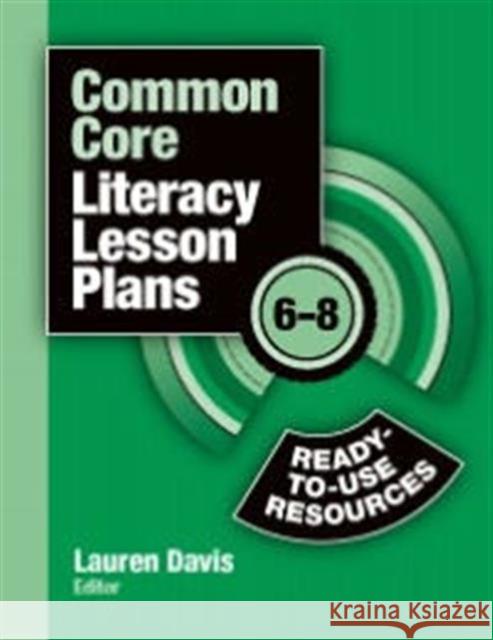Common Core Literacy Lesson Plans: Ready-To-Use Resources, 6-8 » książka



Common Core Literacy Lesson Plans: Ready-To-Use Resources, 6-8
ISBN-13: 9781596672246 / Angielski / Miękka / 2012 / 208 str.
Common Core Literacy Lesson Plans: Ready-To-Use Resources, 6-8
ISBN-13: 9781596672246 / Angielski / Miękka / 2012 / 208 str.
(netto: 121,23 VAT: 5%)
Najniższa cena z 30 dni: 125,48
ok. 22 dni roboczych.
Darmowa dostawa!
Includes bibliographical references (p. [189]).
Glosariusz/słownik
Wydanie ilustrowane
Part 1: Reading Overview Planning Checklist Strategies to Help Struggling Readers Lesson Plans at a Glance Lesson Plan 1: The Text Is a Gold Mine-Let's Start Digging! Answering Text-Based Questions Lesson Plan 2: What's the Big Idea? Tracing a Theme Lesson Plan 3: Leave Your Opinions for Later! Producing an Objective Summary Lesson Plan 4: Who's Telling This Story, Anyway? Analyzing Narrative Point of View Lesson Plan 5: The Parts vs. the Whole: Studying Informational Text Structures Lesson Plan 6: Did That Really Happen? Examining Fact and Fiction in Historical Texts Lesson Plan 7: See It, Hear It, Love It (or Hate It)! Compare Print and Audio Versions of a Poem Lesson Plan 8: Everyone's Entitled to an Opinion: Determine the Author's Point of View Lesson Plan 9: You Be the Judge: Determining Whether the Evidence Is Sound, Sufficient, and Relevant Lesson Plan 10: Is a Picture Worth a Thousand Words? How Different Mediums Explain an Idea Lesson Plan 11: These Authors Aren't on the Same Page: Analyze Texts with Conflicting Information Part 2: Writing Overview Planning Checklist Strategies for Teaching Argument Lesson Plans at a Glance Lesson Plan 12: Let Me Tell You a Legend: Writing a Narrative Lesson Plan 13: I've Got Questions. Who Has Answers? Conduct a Research Project Lesson Plan 14: What's Google Giving You? Evaluating Your Sources Lesson Plan 15: To Quote or Not to Quote? Incorporating Your Sources Lesson Plan 16: Collaborate in the Cloud: Creating a Literature Guide Wiki Lesson Plan 17: Clean-Up Time: Edit the Wordiness from Your Writing Lesson Plan 18: Do They Know What You Know? Describing Technical Information to an Audience Lesson Plan 19: Hook People In! Introducing Your Information Lesson Plan 20: I Say Tomato, You Say To-Mah-To: Effective Argument Techniques Part 3: Speaking and Listening Overview Planning Checklist Strategies for Teaching Speaking and Listening Skills Lesson Plans at a Glance Lesson Plan 21: Yield or Jump In? Creating Balanced Class Discussions Lesson Plan 22: Formalities Required? Considering Audience When Making Language Choices Lesson Plan 23: Look at What I'm Saying! Creating Engaging Presentations Lesson Plan 24: Please Lend Me an Ear: Presenting Your Findings Lesson Plan 25: There's Information at Your Fingertips, But Is it All Worthwhile? Comparing Media Formats Part 4: Language Overview Planning Checklist Strategies for Teaching Vocabulary Lesson Plans at a Glance Lesson Plan 26: The Case of the Missing Pronoun Lesson Plan 27: What's the Right Context for Context Clues? Lesson Plan 28: Let's Figure Out Figurative Language Lesson Plan 29: It's Not All Black and White: Understanding Shades of Meaning in Words Lesson Plan 30: Which Punctuation Mark Are You? Lesson Plan 31: Choppy No More: Writing Compound Sentences to Link Ideas Lesson Plan 32: Switch It Up! Adding Complex Sentences to Your Writing Lesson Plan 33: Keeping the Action Straight: Understanding Verbals Lesson Plan 34: Should You Pass on Passive Writing? Considering Voice Lesson Plan 35: What's Missing? Using an Ellipsis to Indicate an Omission Reading Handouts: Answering a Text-Based Question Step-by-Step Narrative Point of View Activity Sheet Text Structures and Signal Words Let's Talk About Argumentative Texts! A Glossary of Academic Vocabulary Evaluating an Argument Writing Handouts: Story Planning Sheet Research Activity Sheet Analyzing a Website Activity Sheet Ways to Incorporate Sources Argument Map Speaking and Listening Handouts: What's My Discussion Style? Audience Index Cards PowerPoint/Prezi Activity Sheet Presentation Activity Sheet Different Forms of Media Language Handouts: Pronoun Activity Sheet Common Types of Context Clues Personification Activity Sheet Simile and Metaphor Activity Sheet Connotation Graphic Organizer How Punctuation Affects Tone Using Compound Sentences to Link Ideas Using Complex Sentences to Link Ideas Appendix: Blank Lesson Plan Template Sources of Literary and Nonfiction Texts Sample Topics for Argument Essays References
Davis, Lauren
1997-2026 DolnySlask.com Agencja Internetowa
KrainaKsiazek.PL - Księgarnia Internetowa









